| Medically reviewed by
Robin Backlund, BHSc
Last update:
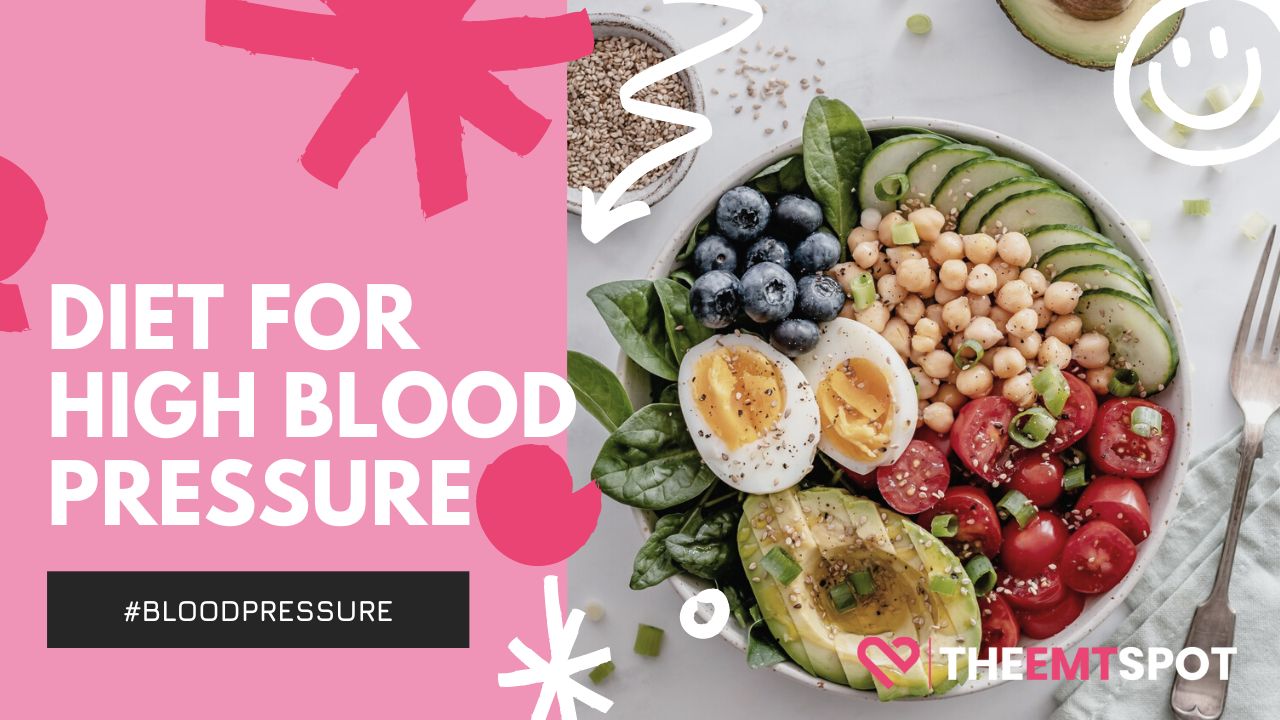
Navigating the world of diets can be challenging, especially when dealing with high blood pressure. The right diet is crucial in managing this condition.
The DASH diet stands out among the diets recommended for high blood pressure. DASH, short for Dietary Approaches to Stop Hypertension, is widely recognized as the best diet for controlling high blood pressure.
This diet has achieved a joint top ranking among 39 diets in the categories of “Best Diets for Healthy Eating” and “Best Heart-Healthy Diets,” according to the 2021 Best Diets report published by U.S. News & World Report.
One of the most crucial studies on the DASH diet was conducted by Professor L. J. Appel and colleagues from Johns Hopkins University. This study was published in the New England Journal of Medicine.
The study demonstrated that the DASH diet significantly reduced systolic and diastolic blood pressure by 5.5 and 3.0 mmHg more, respectively, compared to the control diet.
Additionally, the fruits-and-vegetables diet also positively affected systolic and diastolic blood pressure by 2.8 and 1.1 mmHg more than the control diet, respectively.
Beyond the DASH diet, other heart-healthy eating options effectively manage blood pressure. But what exactly should you eat or avoid?
A top pick for a blood pressure-friendly food is leafy greens, high in potassium, which helps the kidneys flush out sodium, a high blood pressure culprit.
Conversely, processed foods loaded with salt are a definite no-no. In the realm of drinks, herbal teas, especially hibiscus, can be beneficial, whereas excessive alcohol can raise blood pressure levels.
Surprisingly, herbs like licorice can adversely affect blood pressure despite their natural origin. An often-overlooked aspect of managing high blood pressure is regular monitoring at home.
In fact, after diet, constant monitoring is one of the most critical parts of blood pressure management.
While clinic visits are recommended, 21st-century technology has enabled the rise of electronic smart blood pressure monitors that can give you clinically accurate readings in a snap.
Oxiline Pressure X Pro, CheckMe BP2, QardioArm, etc., are some of the top smart blood pressure monitors.
Monitoring at home helps keep track of your blood pressure and assesses how well your dietary choices are working.
Contents
What is the DASH diet?
The DASH diet, known as Dietary Approaches to Stop Hypertension, is more than just a dietary regimen; it serves as a verified path to improved health, especially for individuals with high blood pressure.
This diet aids individuals in reducing their salt intake, which includes sodium, and it is also abundant in nutrients that contribute to the reduction of blood pressure.
Its origins trace back to 1992 when the National Institutes of Health funded a groundbreaking study aimed at exploring the impact of diet on blood pressure.
This study, named the Dietary Approaches to Stop Hypertension (DASH), initially involved 459 adults, some with and some without high blood pressure.
The participants first adhered to a control diet low in fruits, vegetables, and dairy, with a fat content mirroring the average American diet at that time.
After this phase, they were divided into two groups: one that consumed a diet rich in fruits and vegetables and the other that followed a combination diet.
This combination diet was rich in fruits, vegetables, and low-fat dairy, with reduced saturated and total fat. Crucially, sodium intake and body weight were kept constant during the study.
The results were groundbreaking and published in the Current Concepts in Hypertension in 1998. Researchers discovered that the combination diet significantly lowered blood pressure, especially in individuals with hypertension.
Even those with normal blood pressure saw a reduction, though less pronounced. This diet reduced systolic and diastolic blood pressure more effectively than the control diet.
In another follow-up study by Prof. F. M. Sacks in 2001, published in The New England Journal of Medicine, it was found that lower sodium levels, when combined with the DASH diet, could further lower blood pressure.
The study also emphasized the importance of long-term dietary changes and the availability of lower-sodium foods for sustained health benefits.
Today, the DASH diet stands as one of the most extensively studied and recommended diets for managing blood pressure.
Recognized worldwide for its effectiveness, the diet has become easily accessible, with free resources available on the National Institutes of Health website.
This widespread accessibility and the diet’s proven effectiveness make it a cornerstone in managing hypertension. But will you burn your pocket to accommodate this diet? Let’s find it out.
How much does the DASH diet cost?
When it comes to the cost of following the DASH diet, the good news is that the diet itself is free of charge. The resources and guidelines for the DASH diet are readily available to anyone, making it an accessible choice for many.
It’s been ranked by US News & World Report as an easy diet to follow, partly because the foods it recommends are easily found in most grocery stores or farmers’ markets.
The primary expense associated with the DASH diet is the cost of food. However, with smart planning and thoughtful selection, the costs can be quite similar to a typical grocery trip.
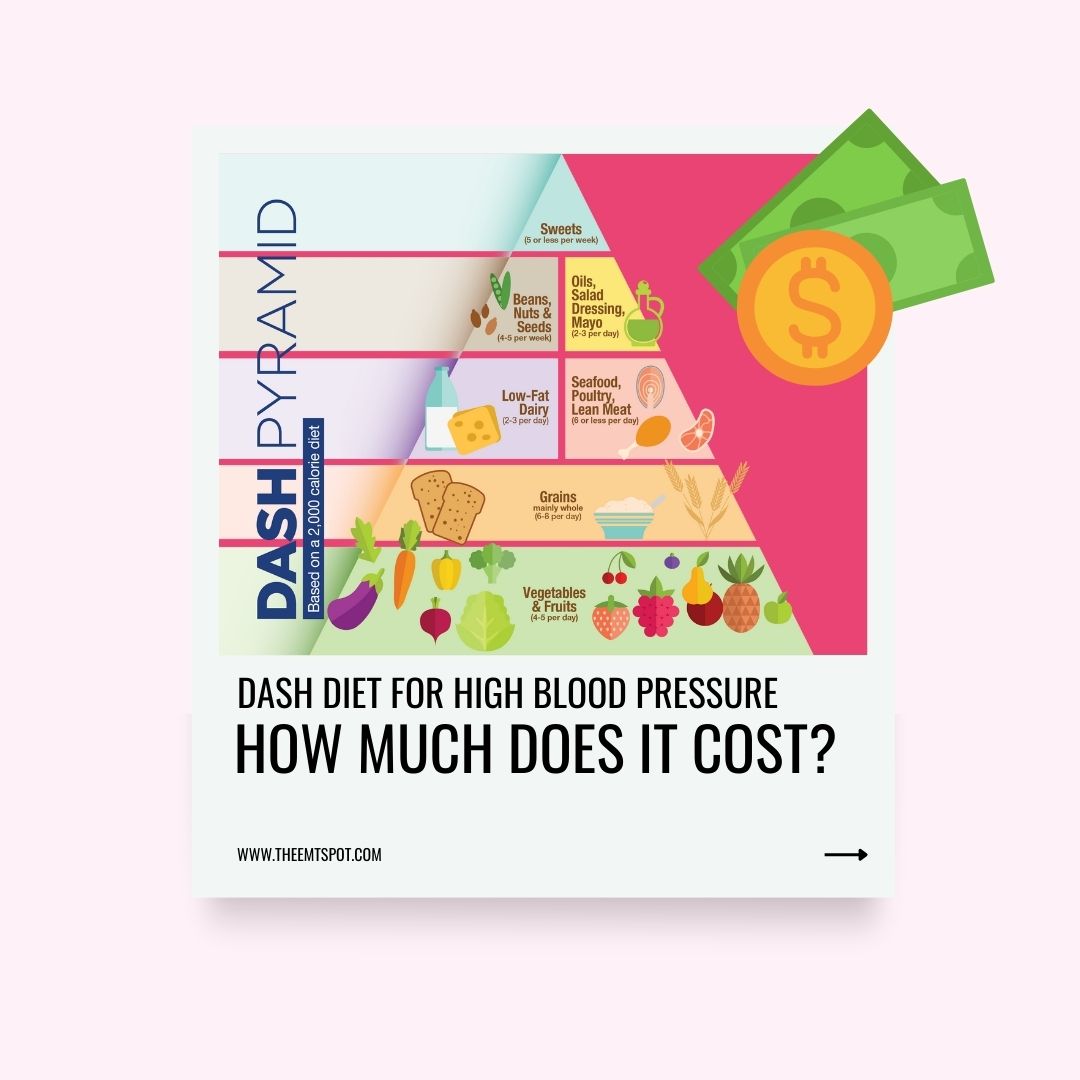
To put a figure on the spending associated with the DASH diet, a study commissioned by a group of researchers from Duke University Medical Center found that in high-socioeconomic status (SES) areas, the weekly cost was higher, averaging around $40.20, compared to $30.73 in low-SES areas.
The study highlights the financial aspect of adopting the DASH diet in different communities, reflecting the impact of socioeconomic factors on diet affordability.
The emphasis of the DASH diet on healthy whole foods doesn’t necessitate purchasing exotic or expensive items.
For instance, a 2013 study published by Pablo Monsivais, Ph.D., MPH, and colleagues in the JAMA International Medicine Journal reported that individuals, such as those from Mexican-American-Hispanic communities, did not see a significant increase in their food spending when adopting the DASH diet.
This is largely because their traditional diet is already nutrient-dense and relatively affordable. The key is to choose foods wisely.
The DASH diet encourages a variety of nutrient-rich, whole foods that can fit into various budgets, making it a feasible option for a wide range of individuals.
With careful meal planning and savvy shopping, following the DASH diet can be both an economically and health-wise smart choice.
While cost won’t be a concern, did you know that you may not have to give up many of your favorite foods? The food list is elaborated below.
What is on the DASH diet food list?
The DASH food list is more or less similar to other diet plans you might have seen before, but here, the list is carefully prepared based on clinical studies and meta-analysis, making it more effective.
But what exactly is on the DASH diet food list?
To answer this question comprehensively, below is a compilation of foods that are recommended in the DASH diet, as published by the National Heart, Lung, and Blood Institute (NHLBI) of the US.
Whether you’re starting your DASH diet journey or seeking a quick reference, this table will serve as your go-to resource for understanding what foods are included in the DASH diet.
Food Category | Description | Examples |
Fruits and vegetables | Rich in vitamins, minerals, and fiber | Apples, spinach, broccoli, carrots |
Whole grains | Includes whole wheat bread, brown rice, and oatmeal | Whole grain pasta, quinoa, whole wheat cereal |
Lean proteins | Skinless poultry, fish, and lean cuts of meat | Chicken breast, salmon, turkey, lean beef |
Nuts, seeds, and legumes | Good sources of protein, healthy fats, and fiber | Almonds, chia seeds, lentils, black beans |
Low-fat or fat-free dairy | Provides calcium and protein with lower fat content | Greek yogurt, skim milk, low-fat cheese |
Healthy fats | Encourages olive oil and avocados, limits saturated fats | Olive oil, avocado, nuts (in moderation) |
Sweets and added sugars | To be consumed sparingly, with an emphasis on minimally processed foods | Dark chocolate (in moderation), honey |
The above is a list of foods that you should include in your DASH diet. However, there are also foods that you should avoid while on the DASH diet. More about them is explained below.
What can’t you eat on the DASH diet?
DASH diet advises a reduction in the consumption of high-sodium foods, red meats, and foods high in saturated fats and added sugars.
This equilibrium guarantees a diet that is both low in sodium and harmful fats yet abundant in fiber, protein, and crucial nutrients.
The DASH diet is not just a list of foods to eat and avoid but a holistic approach to eating that promotes long-term health benefits.
Consequently, it proves advantageous not only for individuals with hypertension but also for those pursuing a healthier way of life.
According to evidence-based publications by Lacey Bourassa on a health website and Mayo Clinic, below are foods you must avoid while following a DASH diet.
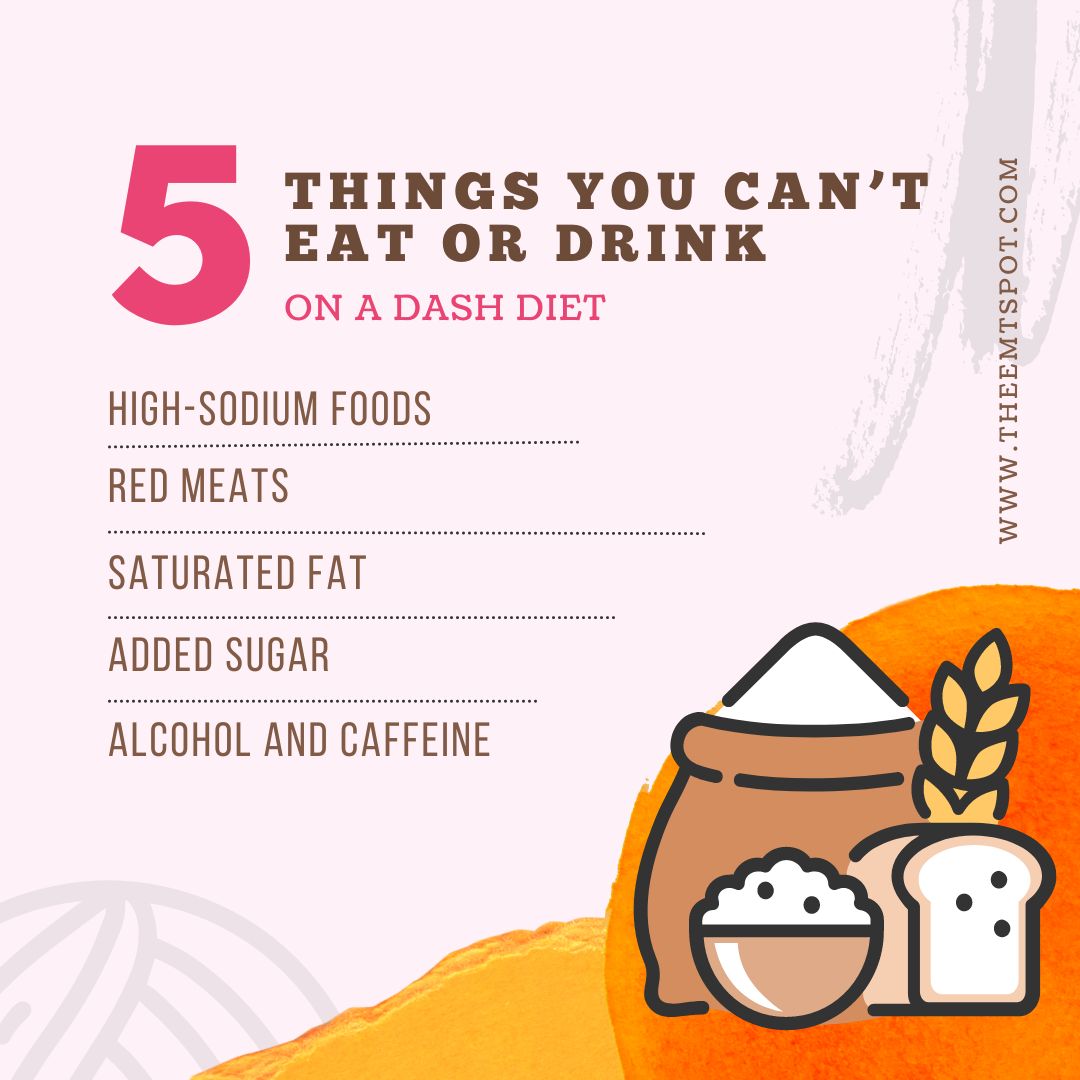
- High-sodium foods: Since the DASH diet aims to reduce hypertension, it’s crucial to limit your intake of salt. This includes avoiding table salt, fast food, pre-packaged food, and processed meats, which are typically high in sodium.
- Red meats: While not completely forbidden, the DASH diet recommends limiting red meat consumption because it’s often high in saturated fat and cholesterol. This includes meats like beef, pork, lamb, and veal.
- Saturated fat: Foods high in saturated fat should be reduced. These include cheese, fatty cuts of meat, poultry with skin, lard, cream, butter, and whole milk.
- Added sugar: It’s advisable to cut back on foods with added sugar. This includes table sugar, sweets, condiments with added sugar, and junk food. Added sugar is high in calories but doesn’t provide nutritional value.
- Alcohol and caffeine: Excessive alcohol can increase blood pressure, so it’s recommended to limit alcohol consumption. The effects of caffeine on blood pressure aren’t entirely clear, but it can cause a temporary increase in blood pressure.
This regulation of food habits is a much-needed step in the success of the DASH diet, as the inclusion of certain foods alone couldn’t achieve the desired results.
You can also consult a nutritionist or check with your doctor for a more customized DASH diet, which could be more effective. Now that you know what to eat, let’s explore how much to eat.
What are the suggested servings on the DASH diet?
Understanding the serving suggestions of the DASH diet is key to its effectiveness.
These recommendations vary based on total calorie intake, which is influenced by factors like age, gender, and activity level.
The daily calorie intake ranges from 1,600 to 2,400 calories for women, while for men, it’s between 2,000 to 3,100 calories.
While calorie counting isn’t mandatory on the DASH diet, the servings from each food group are proportional to the allowed daily calorie intake.
Below is a breakdown of the suggested servings for each food group on the DASH diet as recommended by NIH-NHLBI.
Food Category | Recommended Servings |
Whole grains | 6 to 8 servings a day |
Vegetables | 4 to 5 servings a day |
Fruits | 4 to 5 servings a day |
Low-fat or fat-free dairy | 2 to 3 servings a day |
Lean meats, poultry, and fish | 6 or fewer servings a day |
Nuts, seeds, and beans | 4 to 5 servings a week |
Healthy fats and oils | 2 to 3 servings a day |
Sweets (preferably low-fat or fat-free) | 5 or fewer a week |
Sodium | No more than 2,300 mg a day |
Alcohol | Restrict your alcohol intake to a maximum of 2 drinks daily for men and 1 drink daily for women |
Additional considerations include replacing some carbohydrates with low-fat protein and unsaturated fats for further blood pressure reduction. For weight loss purposes, a daily calorie intake of 1,600 is recommended.
Individuals above the age of 40, those of African American heritage, or those with a diagnosis of hypertension should restrict sodium intake to no more than 1,500 mg.
Following these serving guidelines can help ensure that the diet meets nutritional needs while working towards the goal of reducing blood pressure.
In fact, a researched meal plan is given below that can be used with the above servings to attain healthy heart benefits.
7-Day DASH diet meal plan
The DASH diet provides a structured plan for each day of the week, focusing on heart-healthy foods and maintaining a balanced sodium intake. Below is a 7-day DASH meal plan prescribed by NIH-NHLBI.
Day 1
- Breakfast: Bran flakes cereal, banana, low-fat milk, whole wheat bread with margarine, orange juice.
- Lunch: Chicken salad, whole wheat bread, Dijon mustard, cucumber, and tomato salad with sunflower seeds and low-calorie Italian dressing, fruit cocktail juice pack.
- Dinner: Roast beef eye of round, fat-free beef gravy, sautéed green beans with canola oil, baked potato with fat-free sour cream, reduced-fat cheddar cheese, chopped scallions, whole wheat roll, apple, low-fat milk.
- Snacks: Unsalted almonds, raisins, fat-free no sugar added fruit yogurt.
- Total sodium: 2101 mg.
Day 2
- Breakfast: Instant oatmeal, mini whole wheat bagel with peanut butter, banana, low-fat milk.
- Lunch: Chicken breast sandwich, whole wheat bread, reduced-fat cheddar cheese, romaine lettuce, tomato, low-fat mayonnaise, cantaloupe chunks, apple juice.
- Dinner: Spaghetti, vegetarian spaghetti sauce, Parmesan cheese, spinach salad with fresh carrots, mushrooms, vinaigrette dressing, cooked corn, canned pears juice pack.
- Snacks: Unsalted almonds, dried apricots, fat-free no sugar added fruit yogurt.
- Total sodium: 2035 mg.
Day 3
- Breakfast: Bran flakes cereal, banana, low-fat milk, whole wheat bread with margarine, orange juice.
- Lunch: Beef barbeque sandwich, roast beef, barbeque sauce, reduced-fat cheddar cheese, hamburger bun, romaine lettuce, tomato, new potato salad, orange.
- Dinner: Cod with lemon juice, brown rice, cooked spinach sautéed with canola oil and slivered almonds, cornbread muffin with margarine.
- Snacks: Fat-free no sugar added fruit yogurt, unsalted sunflower seeds, graham crackers with peanut butter.
- Total sodium: 2114 mg.
Day 4
- Breakfast: Whole wheat bread with margarine, fat-free no sugar added fruit yogurt, peach, grape juice.
- Lunch: Ham and cheese sandwich with low-fat low-sodium ham, whole wheat bread, romaine lettuce, tomato, reduced-fat cheddar cheese, low-fat mayonnaise, carrot sticks.
- Dinner: Spicy baked fish, scallion rice, spinach sauté with canola oil and unsalted slivered almonds, cooked carrots, whole wheat roll with margarine, cookie.
- Snacks: Unsalted almonds, apple juice, apricots, low-fat milk.
- Total sodium: 2312 mg.
Day 5
- Breakfast: Whole grain oat rings cereal, banana, low-fat milk, raisin bagel with peanut butter, orange juice.
- Lunch: Tuna salad plate, romaine lettuce, whole wheat bread, cucumber salad, low-fat cottage cheese with canned pineapple and unsalted almonds.
- Dinner: Turkey meatloaf, baked potato with fat-free sour cream, reduced-fat cheddar cheese, scallion, collard greens sautéed with canola oil, whole wheat roll, peach.
- Snacks: Fat-free no sugar-added fruit yogurt, unsalted sunflower seeds.
- Total sodium: 2373 mg.
Day 6
- Breakfast: Low-fat granola bar, banana, fat-free no sugar added fruit yogurt, orange juice, low-fat milk.
- Lunch: Turkey breast sandwich, cooked turkey breast, whole wheat bread, romaine lettuce, tomato, low-fat mayonnaise, Dijon mustard, steamed broccoli, orange.
- Dinner: Spicy baked fish, scallion rice, spinach sauté with canola oil and unsalted almonds, cooked carrots, whole wheat roll with margarine, small cookie.
- Snacks: Unsalted peanuts, low-fat milk, dried apricots.
- Total sodium: 1671 mg.
Day 7
- Breakfast: Whole grain oat rings, banana, low-fat milk, fat-free no sugar added fruit yogurt.
- Lunch: Tuna salad sandwich, mayonnaise, romaine lettuce, tomato, whole wheat bread, apple, low-fat milk.
- Dinner: Zucchini lasagna, salad with fresh spinach, tomato wedges, seasoned croutons, reduced calorie vinaigrette dressing, sunflower seeds, whole wheat roll with margarine, grape juice.
- Snacks: Unsalted almonds, dry apricots, whole wheat crackers.
- Total sodium: 2069 mg.
Are there other diets besides the DASH diet that are good for high blood pressure?
While the DASH diet is highly recommended for managing high blood pressure, it’s not the sole dietary approach that can be beneficial. Various diets renowned for their heart-healthy benefits may also effectively control hypertension.
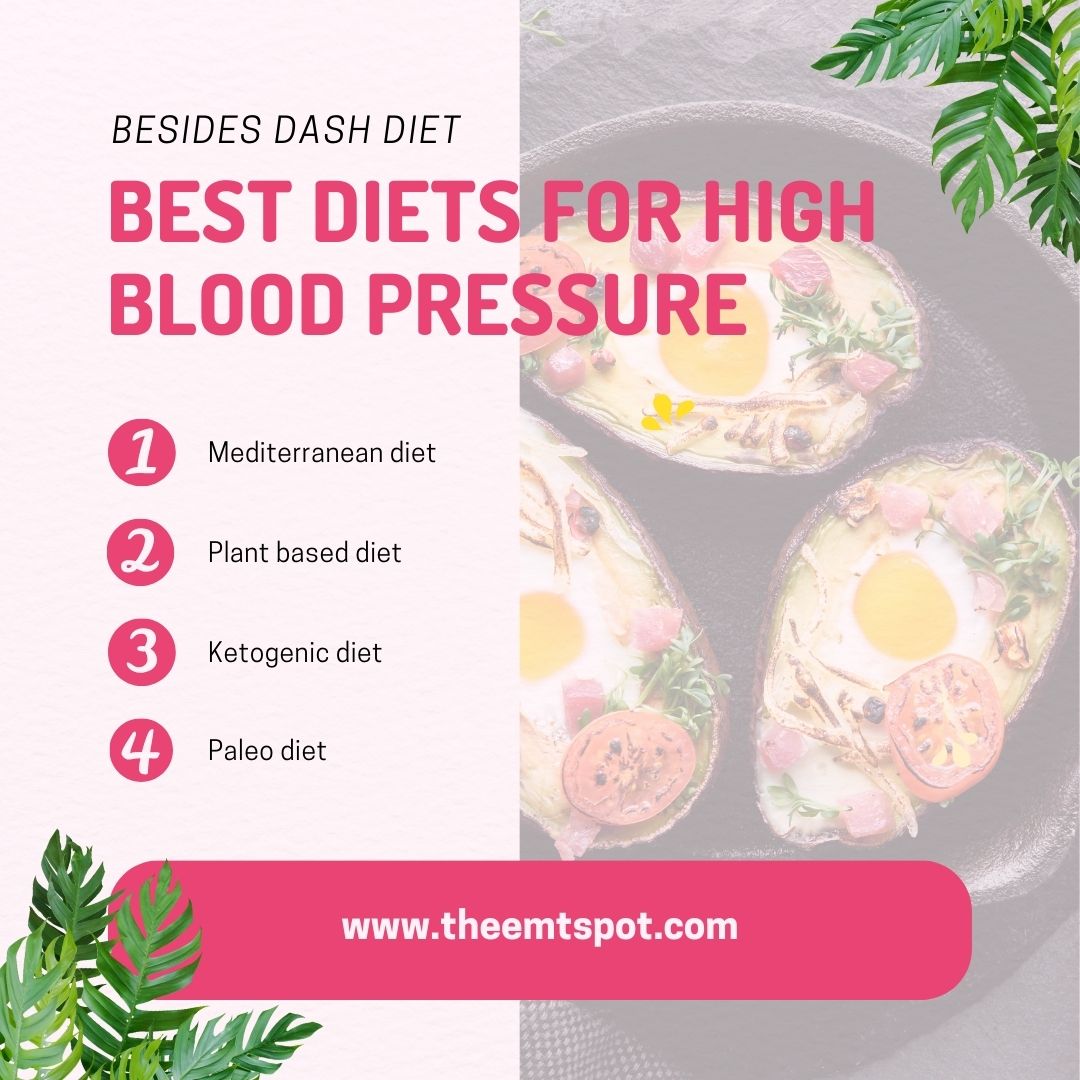
Several studies suggest that the Mediterranean diet positively influences blood pressure reduction.
This dietary regimen prioritizes fruits, vegetables, whole grains, nuts, and olive oil while incorporating fish and poultry in moderation, ultimately promoting overall well-being.
Rich in healthy unsaturated fats and low in red meat and sweets, the Mediterranean diet aligns well with blood pressure management goals.
Another noteworthy dietary option is the plant-based or vegan diet, emphasizing fruits, vegetables, legumes, nuts, and seeds while minimizing or eliminating meat and animal products.
Such diets tend to be high in potassium, magnesium, and fiber, all of which are known to contribute to lower blood pressure.
Additionally, diets that promote weight loss, such as calorie-restricted or low-carb diets, can also prove beneficial for blood pressure control, particularly among overweight or obese individuals.
The Ketogenic diet, which involves reducing carbohydrate intake and increasing fat consumption to trigger ketosis, where the body utilizes fat for energy, is one such option.
The Paleo Diet, centered on foods presumed to have been accessible during the Paleolithic era—lean meats, fish, fruits, vegetables, nuts, and seeds—is another dietary approach to consider.
Weight loss itself significantly impacts blood pressure, making calorie-restricted or low-carb diets beneficial.
Lastly, the Carnivore diet, primarily composed of animal-based foods, is a controversial approach with limited evidence of its effect on blood pressure.
Each of these diets shares common elements with the DASH diet, such as a focus on whole foods with a significant reduction in processed foods and salt.
The key is to select a diet that not only aids blood pressure management but also aligns with your lifestyle and dietary preferences, ensuring long-term adherence and success.
Having explored these dietary options, let’s delve into each one’s impact on blood pressure.
Is the Mediterranean diet good for high blood pressure?
Yes, the Mediterranean diet is highly beneficial for managing high blood pressure, and several studies have underscored its effectiveness in lowering blood pressure.
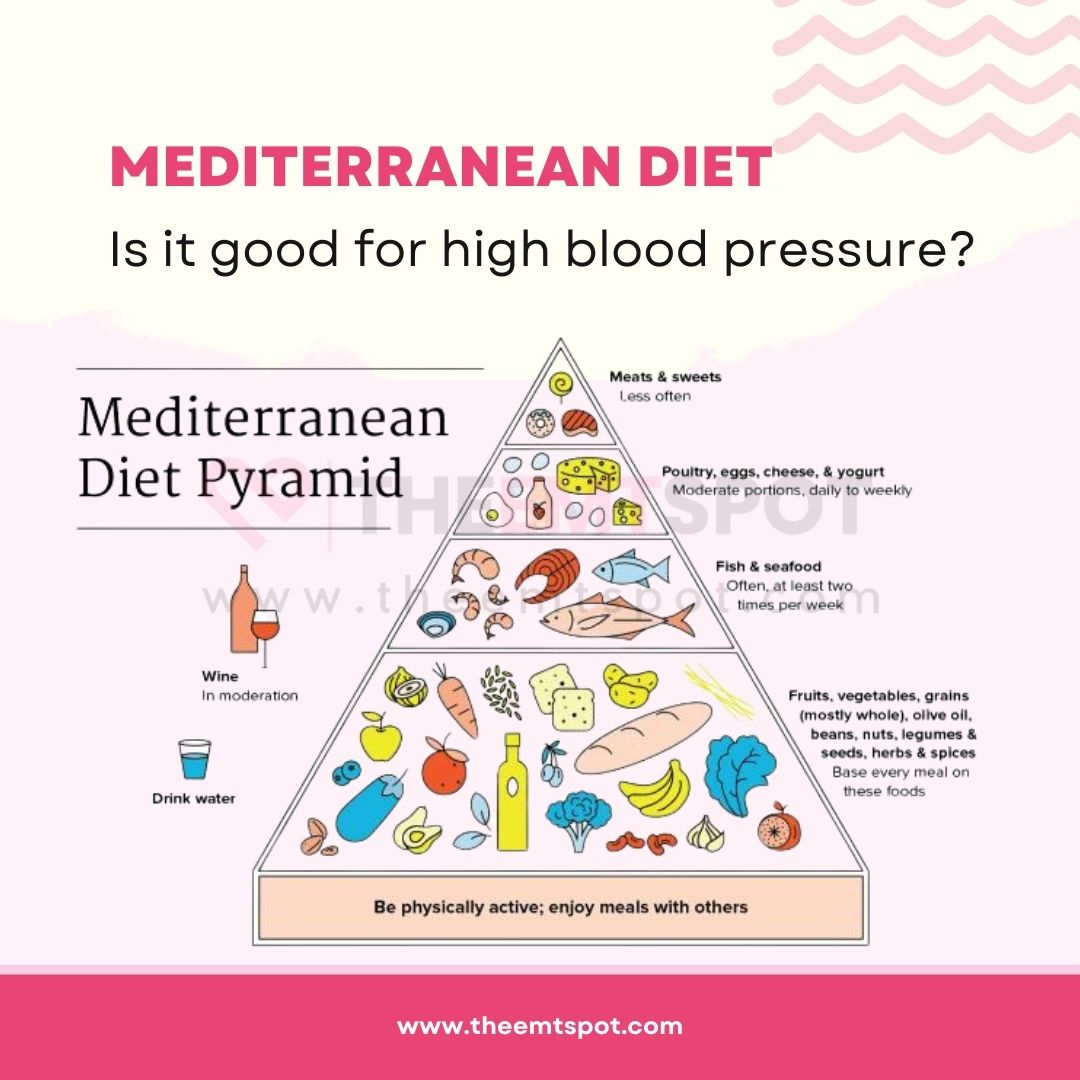
A study published by Giovanni De Pergola and Annunziata D’Alessandro in the journal Nutrients suggests that the Mediterranean diet has a positive influence on reducing blood pressure.
This is, in fact, agreed upon by health experts and prominent health organizations, including the American Heart Association (AHA), in effectively addressing hypertension and its associated health conditions, such as cholesterol issues, obesity, diabetes, heart diseases, and stroke.
Central to the Mediterranean diet are its healthy dietary patterns. It predominantly consists of fruits, vegetables, beans, nuts, legumes, and seeds.
Olive oil serves as the primary fat source, and the diet includes whole-grain foods alongside moderate amounts of seafood, lean meat, and dairy.
Importantly, this diet limits the intake of added sugar, salt, processed, and refined foods and typically avoids canned, deep-fried, junk foods and those high in preservatives.
One critical factor is the presence of olive oil, particularly extra virgin olive oil, known to aid in reducing the risk of high blood pressure and facilitating the elimination of abnormal cholesterol from blood vessels.
This action helps prevent blockages in blood flow and improves the endothelial lining of blood vessels, which is crucial for maintaining vascular health.
The diet’s richness in fruits, vegetables, whole grains, and healthy fats provides essential nutrients crucial for blood pressure control.
Potassium, abundant in vegetables and fruits, is instrumental in dilating blood vessels, ensuring smooth blood flow.
Additionally, the high dietary fiber content in these foods aids in maintaining satiety, thus preventing overeating and potential weight gain, which is beneficial for blood pressure management.
Is the vegan diet good for high blood pressure?
Yes, a vegan diet can be beneficial for high blood pressure reduction, and this diet excludes animal products, including meat, dairy, eggs, and other derivatives from animals.
According to the AHA, plant-based diets, such as veganism, are recognized as a healthful dietary option with great potential to control hypertension and enhance overall cardiac well-being.
This regimen predominantly revolves around plant-derived foods like fruits, vegetables, grains, legumes, nuts, and seeds.
It offers abundant dietary fiber, phytonutrients, and antioxidants while often featuring lower calorie and saturated fat levels compared to omnivorous diets.

The favorable impact on blood pressure is primarily attributed to the diet’s ample provision of fruits, vegetables, and whole grains, rich in essential elements like potassium, magnesium, and fiber, known for their blood pressure-lowering effects.
Additionally, vegan diets generally demonstrate reduced levels of saturated fats and cholesterol, which are factors associated with hypertension and increased susceptibility to heart disease.
The absence of red meat, which tends to be high in saturated fats, further promotes cardiac health and maintains optimal blood pressure.
Evidence supporting the benefits of a vegan diet on blood pressure comes from various studies and expert opinions.
A 2014 study published in JAMA Internal Medicine by Yoko Yokoyama, PhD, MPH et al. found that plant-based diets, including vegan diets, were associated with lower blood pressure compared to omnivorous diets.
This study analyzed data from over 258 studies, 7 clinical trials, and 32 case studies before concluding that adherence to a plant-based diet was beneficial for lowering high blood pressure.
The authors of the study regard the vegan diet as a non-pharmacological means to decrease hypertension, which, when combined with years of knowledge from traditional medicine, corroborates clinical findings.
Is the keto diet good for high blood pressure?
The influence of the keto diet on blood pressure reduction is a debated topic, but it was observed to be effective by many people.
The ketogenic (keto) diet is recognized for its high-fat, moderate-protein, and very low-carbohydrate composition, with the primary aim of inducing ketosis, wherein the body utilizes fat for energy instead of carbohydrates.
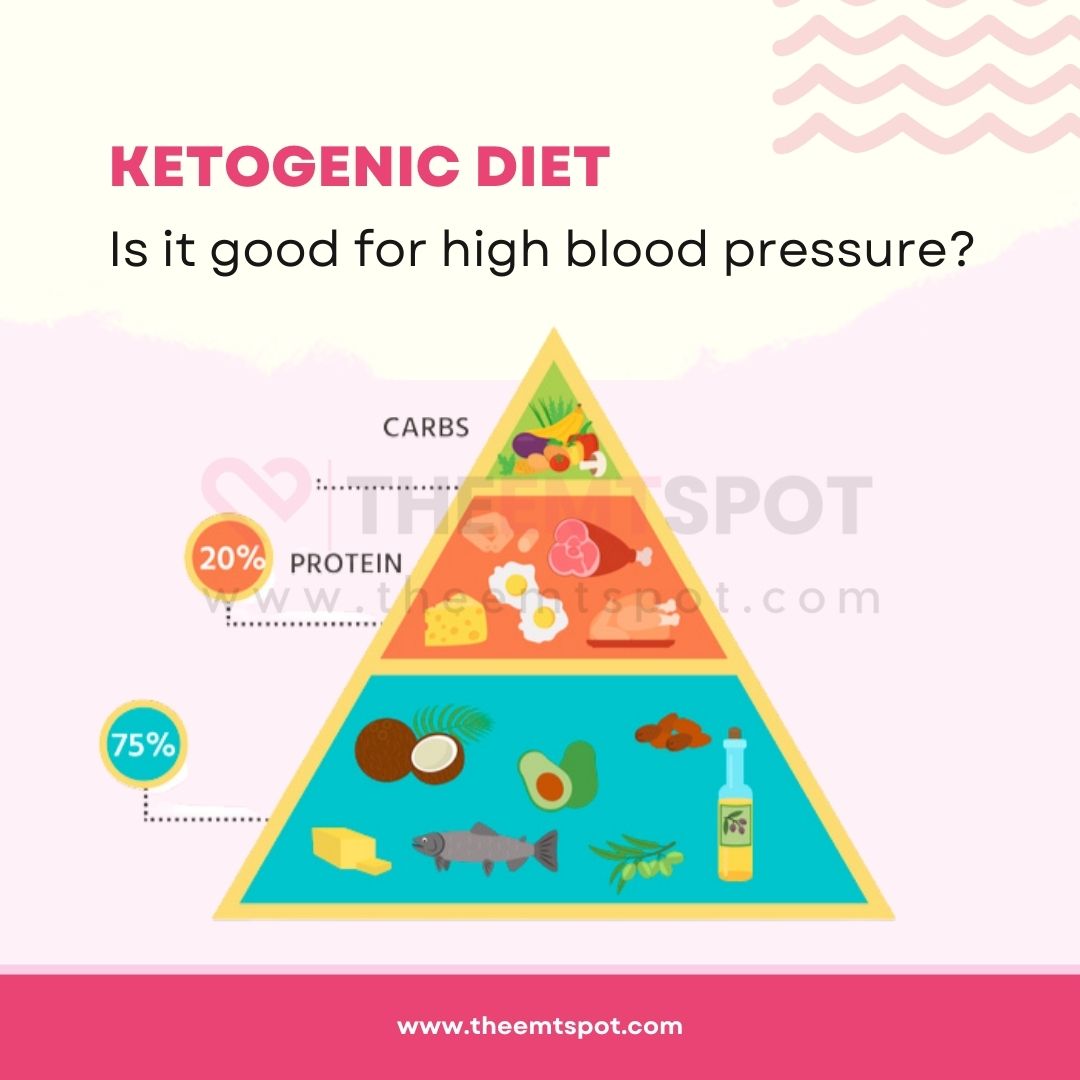
Some potential benefits, such as weight loss and improved blood sugar levels, may indirectly impact blood pressure.
Lowering triglycerides, a type of blood fat, is another potential advantage often associated with the keto diet, potentially benefiting cardiovascular health. However, uncertainties persist regarding the long-term effects of the keto diet on heart health.
While there are suggestions of potential benefits, particularly in terms of weight loss and metabolic enhancements, the diet also raises concerns.
These concerns encompass potential increases in LDL (bad) cholesterol, risks of dehydration, and possible kidney issues, especially among individuals with pre-existing heart conditions.
Scientific studies and expert opinions on the keto diet’s influence on blood pressure and heart health present a mixed picture.
Consensus is lacking regarding the long-term safety and efficacy of the keto diet for blood pressure management among experts.
For example, a 2021 narrative review authored by researchers from the University of Palermo and published in Nutrients recognizes the potential effects of the ketogenic diet on cardiovascular health.
According to this review, the ketogenic diet might contribute to blood pressure reduction through mechanisms such as weight loss, reduced carbohydrate intake, and enhanced endothelial function, although further research is deemed necessary.
Nevertheless, this review refrains from making definitive claims regarding the diet’s benefits or risks concerning blood pressure.
Due to potential risks and the limited availability of long-term data, experts generally recommend a balanced diet for individuals with heart conditions.
Such a diet should incorporate complex carbohydrates, unsaturated fats, lean proteins, fresh fruits and vegetables, and restrict the intake of red meat and processed foods.
Individuals contemplating the keto diet, particularly those with heart conditions, are advised to consult a healthcare provider to gain insights into the potential risks and benefits specific to their health situation.
Is the paleo diet good for high blood pressure?
The Paleo diet can aid in reducing hypertension. It is also known as the caveman or Stone Age diet, based on early humans’ presumed diet.
It primarily consists of meat, fish, vegetables, and fruit and excludes dairy, grain products, and processed food. The diet focuses on whole foods and eliminates modern processed foods believed to be incompatible with human health.
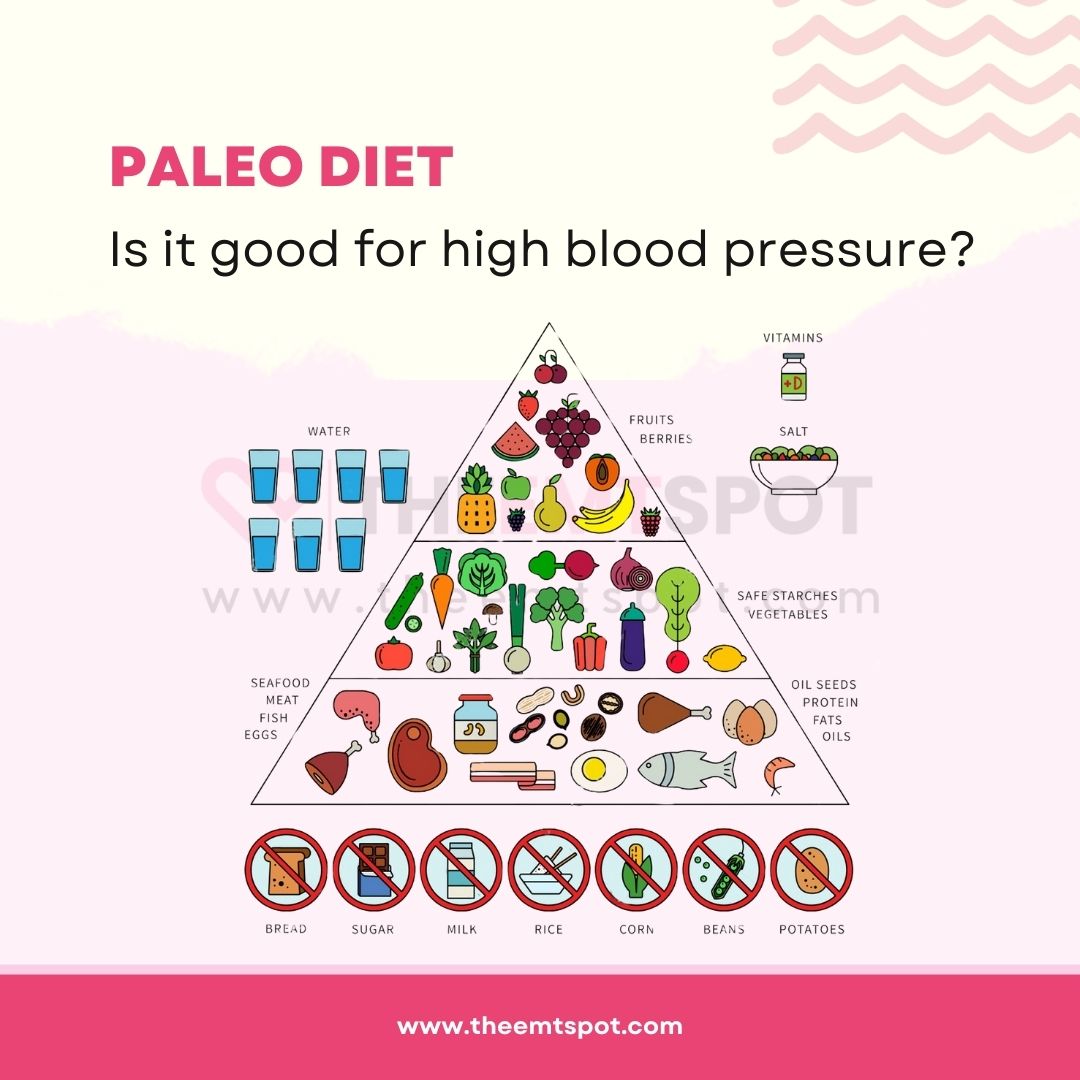
The Paleo diet has a positive impact on blood pressure. This diet involves eating foods that are naturally low in sodium and high in potassium, both of which are important for maintaining healthy blood pressure levels.
Excluding processed foods, which are often high in sodium, from the Paleo diet can also reduce blood pressure.
Furthermore, the diet’s emphasis on fruits and vegetables, abundant in fiber and essential nutrients, supports cardiovascular health.
Research and expert opinions suggest that the Paleo diet can benefit cardiovascular health and help lower blood pressure.
One such study highlighting this fact was published in the Journal of Diabetes Science And Technology by David C. Klonoff, M.D., FACP.
According to the study, the Paleo diet may lower blood pressure through improved insulin sensitivity, reduced inflammation, and antioxidants, preventing blood sugar spikes and vessel damage.
This is also attributed to the diet’s low sodium content and its focus on whole, unprocessed foods. Additionally, the high protein content of the diet can support weight loss, which is another factor in managing blood pressure.
However, it’s important to note that the long-term effects of the Paleo diet are not fully understood, and there are some concerns regarding the exclusion of certain food groups like grains and dairy, which provide essential nutrients.
Nutrition experts often recommend a balanced approach to diet that includes a variety of food groups.
Is the carnivore diet good for high blood pressure?
The impact of the carnivore diet on blood pressure is not definitively understood and can vary from person to person.
The carnivore diet consists exclusively of animal products, typically including meat, fish, eggs, and certain dairy products, while excluding all plant-based foods.
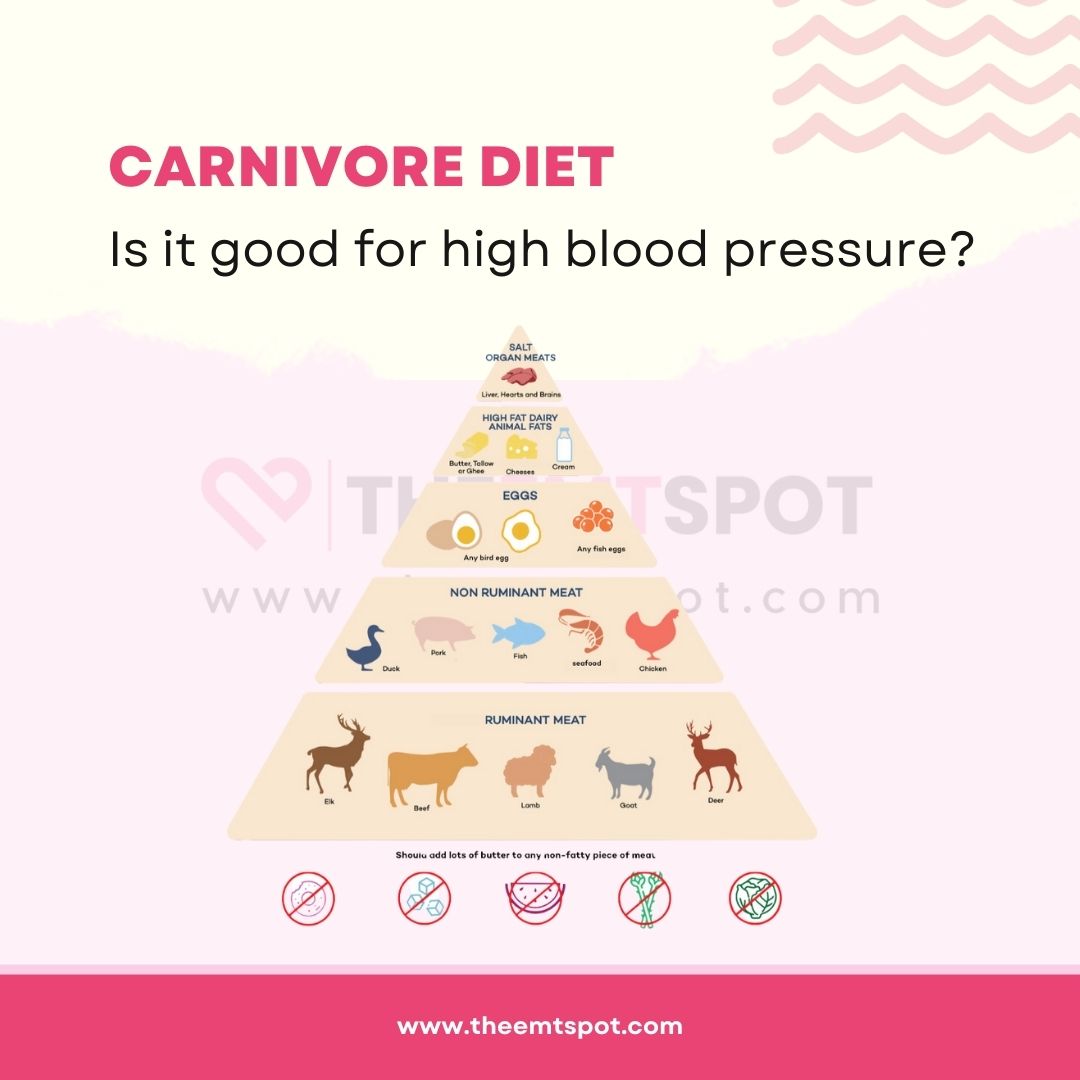
Some evidence suggests that the carnivore diet might be safe for people with high blood pressure and could help manage or improve it.
This improvement in blood pressure could be attributed to weight loss, which is often associated with the carnivore diet.
A 2021 study involving researchers from Boston Children’s Hospital assessed 2029 participants who followed the carnivore diet for at least six months.
They found that among those who reported having high blood pressure, 93% experienced improvements or resolution of their hypertension.
However, this survey did not include a control group, and its findings may not be generalizable to all populations.
Another fascinating piece of evidence supporting the carnivore diet is the Bellevue hospital experiment in 1928 involving Vilhjalmur Stefansson and Karsten Anderson, who followed a meat-only diet for a year and showed no increase in blood pressure.
In fact, Anderson’s systolic blood pressure improved from 140 mmHg to 120 mmHg.
It’s important to note that while some individuals may report benefits from the carnivore diet in managing high blood pressure, the diet is extremely restrictive and eliminates entire food groups. This can lead to potential nutritional deficiencies and other health risks.
It is high in saturated fats, which might elevate LDL cholesterol and increase the risk of heart disease. Furthermore, the long-term effects of this diet are not well studied.
Healthcare professionals generally recommend a balanced diet that includes a variety of foods from different groups for overall health and well-being.
Individuals with pre-existing conditions like high blood pressure should consult with a healthcare provider before making significant dietary changes.
Does fasting lower blood pressure?
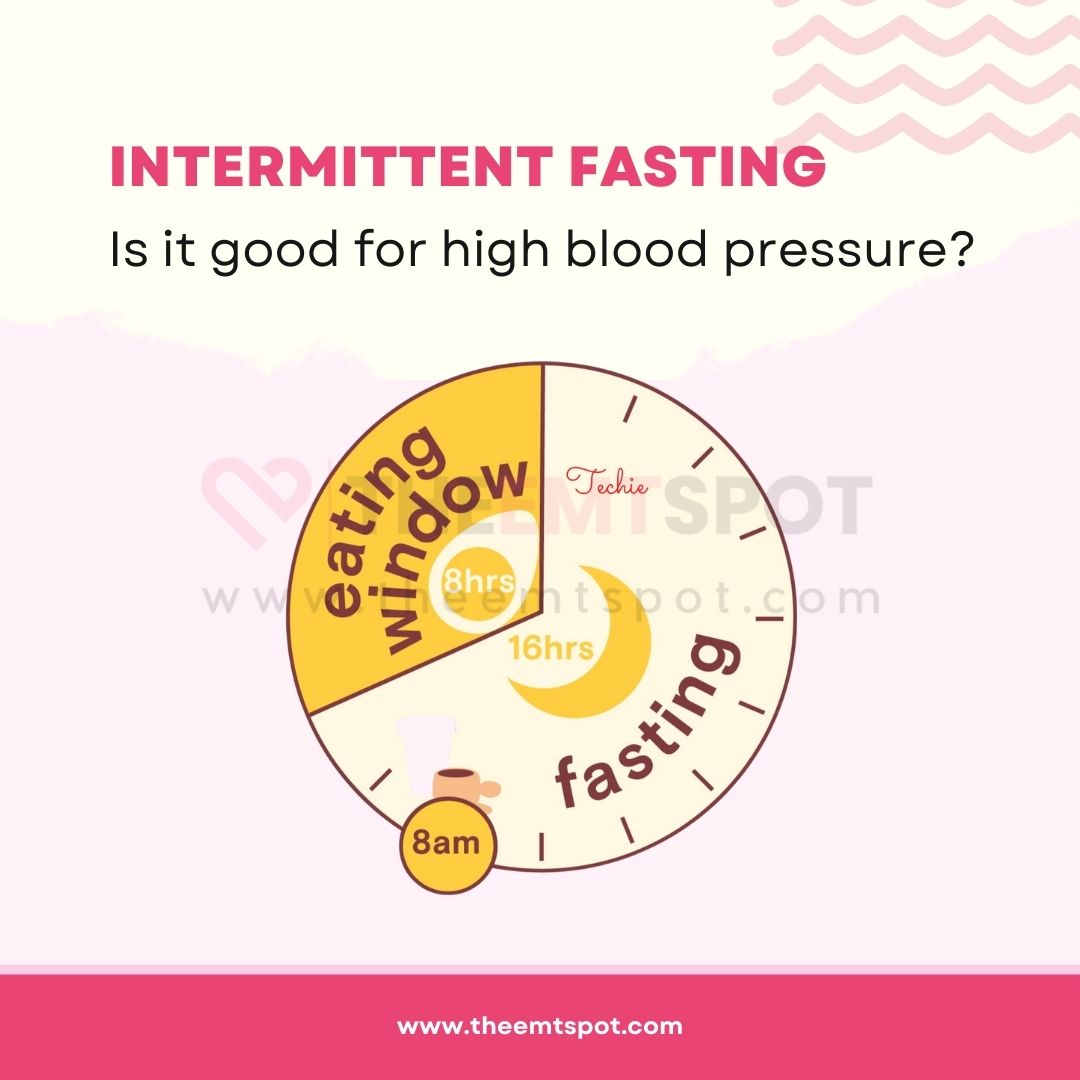
Indeed, fasting, including methods like intermittent fasting, has shown the potential to reduce blood pressure. This effect, however, seems to be temporary, as blood pressure typically returns to baseline levels after fasting.
Importantly, this decrease in blood pressure during fasting is not solely a result of dehydration. Instead, it is largely attributed to factors such as caloric restriction and shifts in the state of the nervous system.
Fasting tends to promote parasympathetic tone, a relaxed state of the nervous system, which contrasts with the sympathetic tone associated with elevated blood pressure.
Furthermore, fasting may also have an impact on the gut microbiome, potentially contributing to its role in blood pressure regulation.
Cardiologist and endocrinologist Dennis Bruemmer, MD, PhD, emphasizes the benefits of fasting.
“Research shows that fasting can help lower blood pressure, reduce cholesterol, control diabetes, and reduce weight.”
He adds:
“Four of the major risks for heart disease are high blood pressure and cholesterol, diabetes, and weight, so there’s a secondary impact,” suggesting that fasting can reduce heart disease risk.
However, he cautions about the potential for electrolyte imbalance, noting that medical supervision is necessary.
“So whenever we prescribe certain diets, including a very low-calorie diet and protein-sparing modified fast diet, these require medical supervision.”
It’s crucial to recognize that fasting might not be suitable for everyone and demands careful consideration, particularly for individuals with specific health conditions.
Fasting is a scientifically supported approach that can have a positive impact on blood pressure. However, when deciding what to eat, the DASH diet isn’t the only option, especially if you are a seemingly healthy individual.
Below are certain foods you can prioritize if blood pressure health is on your mind.
What are the best foods for high blood pressure?
While the DASH diet is specifically designed for blood pressure management, there is a common consensus rooted in traditional practices, scientific studies, and regional food habits regarding cardio-friendly foods.
Below are a few foods suggested by professionals from the Cleveland Clinic that can help lower blood pressure and maintain it in a healthy range.
- Fruits and vegetables: Spinach, tomatoes, carrots, grapefruits, and bananas are excellent choices. Bananas are notably high in potassium, which helps to rid the body of sodium, a known contributor to high blood pressure.
- Nuts and seeds: Options like pistachios, almonds, flax seeds, pumpkin seeds, walnuts, and peanuts are beneficial.
- Foods high in selenium: This includes seafood such as tuna, halibut, and shrimp, along with Brazil nuts, chicken, and turkey.
- Foods high in L-arginine: This amino acid aids in producing nitric oxide, which relaxes muscle cells. It’s found in meat, poultry, dairy, beans like chickpeas and soybeans.
- Calcium-rich foods: Dairy products, almonds, dark green leafy vegetables, broccoli, dried beans and peas, fortified tofu, and fortified orange juice.
- Garlic: Known to reduce inflammation, garlic can help lower blood pressure, and substituting it for salt can be beneficial.
While the list is not exhaustive, these common foods aid blood pressure and can be 09C00Bconsidered without following the DASH diet.
These foods can easily be included in your daily routine and don’t require extra investment like other diet plans. Below is a quick list of drinks that will help reduce blood pressure.
What are the best drinks for high blood pressure?
Among the many dietary options available, certain juices and beverages have shown promising effects in helping to regulate blood pressure.
These natural options offer a range of nutrients and compounds that may help you manage and improve your blood pressure, ultimately contributing to a healthier heart.
Below is a list of drinks compiled from various health journals and publications that can help you maintain a healthy blood pressure level.
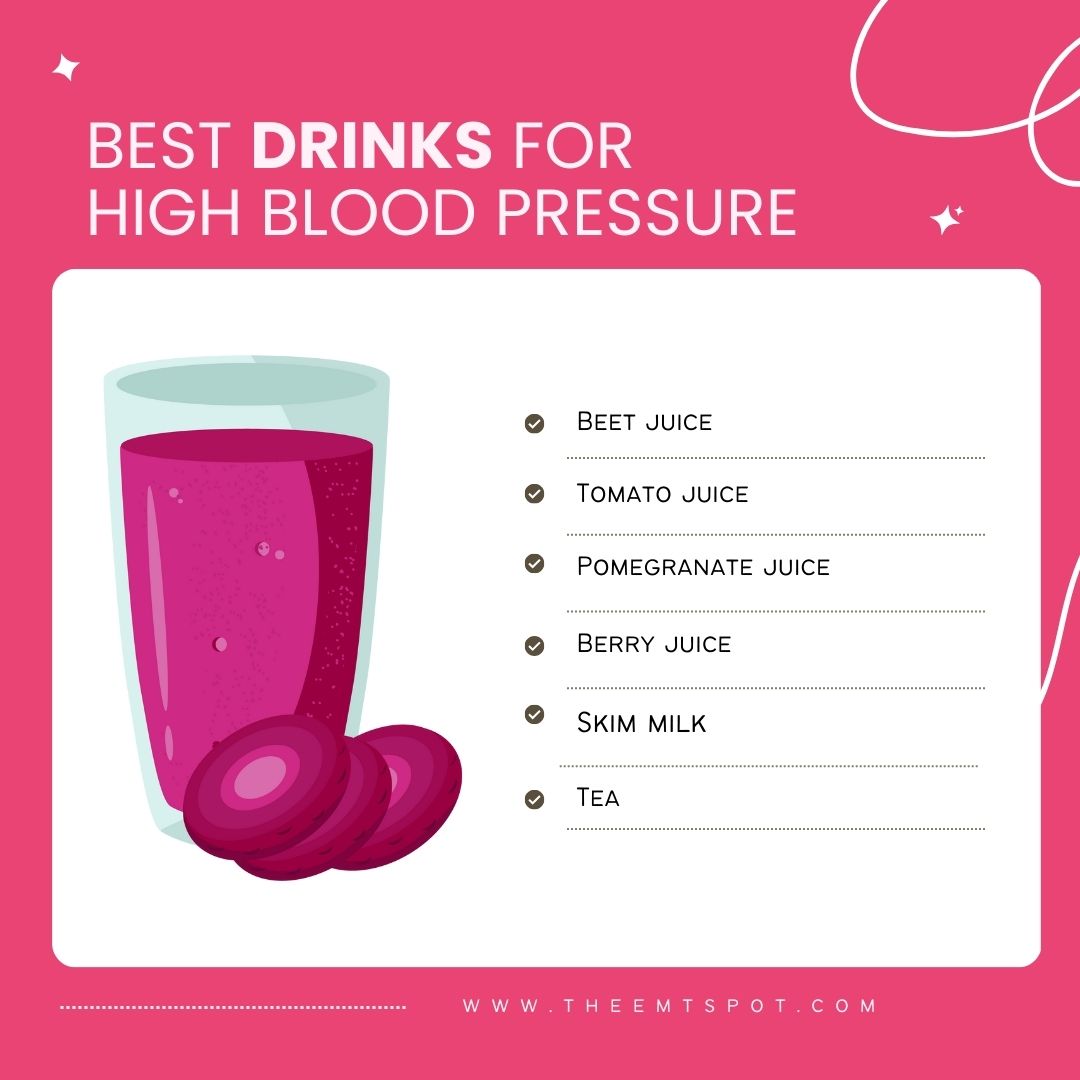
- Beet juice: Rich in nitrates, beet juice lowers blood pressure, especially when consumed raw, backed by scientific studies.
- Tomato juice: Regular consumption of unsalted tomato juice can improve blood pressure and lower LDL cholesterol levels.
- Pomegranate juice: Nutrient-rich pomegranate juice reduces both systolic and diastolic blood pressure, offering heart-healthy benefits.
- Berry juice: Cranberry and cherry juices can lower blood pressure and LDL cholesterol without added sugars, per a 2020 review.
- Skim milk: Low-fat dairy, like skim milk, part of the DASH diet, may reduce blood pressure due to phosphorus and calcium.
- Tea: Both black and green tea lower blood pressure, with green tea showing more significant reductions, supported by research.
The above drinks can easily be made a part of your diet plan, and some of them are even included in the DASH diet plan as well. Similarly, a few herbs can have beneficial effects on blood pressure, as elaborated below.
What are the best herbs for high blood pressure?
Herbs are commonly used in homemade and pre-made foods. According to a 2019 study published in the Journal of Hypertension by Dr. Kate and colleagues, below are a few herbs that have a positive impact on blood pressure.
- Basil: Sweet basil contains eugenol, a natural calcium channel blocker that relaxes blood vessels, potentially lowering blood pressure, though more human research is needed.
- Parsley: Parsley’s vitamin C and carotenoid compounds may reduce blood pressure, acting as a calcium channel blocker, but further human research is required.
- Celery seeds: Rich in magnesium and fiber, celery seeds could lower blood pressure, which is supported by rat studies, but human research is needed for confirmation.
- Chinese Cat’s Claw: Chinese cat’s claw may lower blood pressure by acting as a calcium channel blocker and stimulating nitric oxide production, though human research is limited.
- Bacopa Monnieri: Bacopa monnieri’s potential to lower blood pressure by stimulating nitric oxide release needs more human research for validation.
- Thyme: Thyme’s rosmarinic acid may lower blood pressure by inhibiting ACE and reducing inflammation, but human research is limited.
- Cinnamon: Cinnamon may dilate blood vessels, reducing both systolic and diastolic blood pressure with consistent consumption.
- Ginger: Ginger may lower blood pressure by acting as a calcium channel blocker and ACE inhibitor, reducing the risk of high blood pressure development.
- Cardamom: High in antioxidants, cardamom may lower blood pressure as a calcium channel blocker and diuretic, with potential benefits supported by a 12-week study in adults. More human research is needed for confirmation.
While all the above are foods that you can include in your existing diet, the following are a few foods that you must avoid.
What foods should you avoid when you have high blood pressure?
So far, we have reviewed foods included in the DASH diet or can be incorporated into your existing food plan. However, it’s equally important to avoid specific foods that can harm your blood pressure management.
Below are some of the foods that should be avoided if you have hypertension. According to the AHA, these foods are strictly discouraged for individuals working on improving their cardiovascular health.
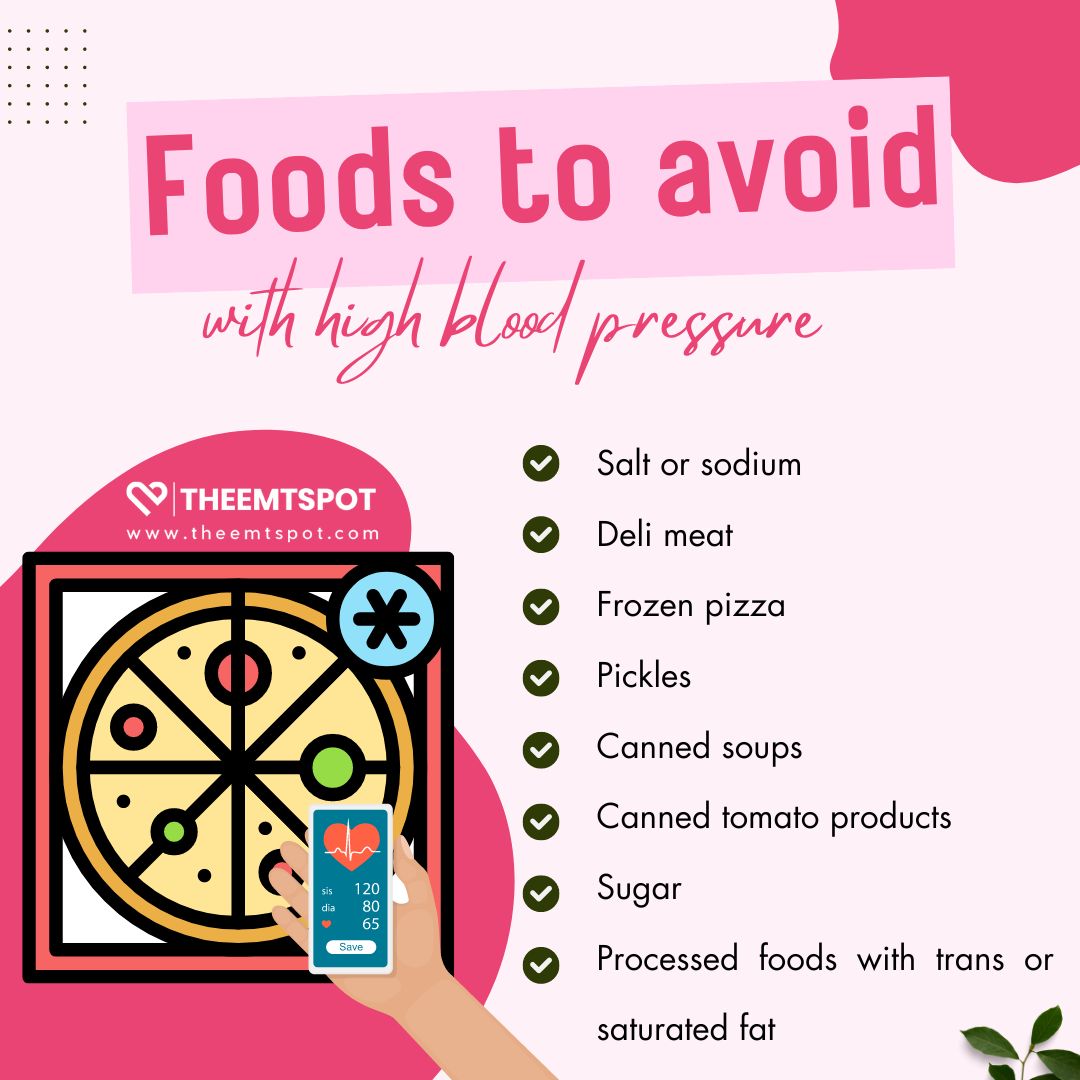
- Salt or sodium: High-sodium foods, like processed snacks and canned goods, can lead to hypertension. The AHA suggests limiting sodium intake to 2,300 mg daily.
- Deli meat: Processed deli meats, such as bologna and hot dogs, contain excessive sodium. Two slices of bologna have 910 mg of sodium, contributing to the high intake of sandwiches.
- Frozen pizza: Frozen pizzas often contain excess sugar, saturated fat, and sodium. Opt for homemade pizza with fresh ingredients for a healthier choice.
- Pickles: Pickled foods, like cucumbers, are sodium-rich due to preservation methods. Seek reduced-sodium alternatives to cut back on salt intake.
- Canned soups: Canned soups, including broths and stocks, are convenient but typically high in sodium. Choose low-sodium options or prepare homemade soup.
- Canned tomato products: Canned tomato sauces and juices are sodium-heavy. Opt for low-sodium versions or use fresh tomatoes for healthier alternatives.
- Sugar: Excess sugar contributes to weight gain and high blood pressure. Limit daily added sugar to 6 teaspoons for women and 9 teaspoons for men, per the AHA.
- Processed foods with trans or saturated fat: Avoid trans fats found in full-fat dairy, butter, and red meat, as they increase hypertension risk. Choose healthier fats from nuts, seeds, olive oil, and avocados.
Drinks can also have a detrimental impact, and here are some such beverages that you should eliminate from your meal plan.
What drinks should you avoid when you have high blood pressure?
There are several drinks that you must avoid if you have high blood pressure, such as alcohol and caffeinated beverages.
The reason is that some of these drinks are processed in a way that results in higher concentrations of active components than safe limits, which could potentially harm cardiovascular health.
Individuals with elevated blood pressure are generally counseled to restrict or reduce the consumption of specific beverages that can adversely affect blood pressure readings.
Below are some common types of drinks that are often recommended by AHA to avoid or consume in moderation if you have high blood pressure.
- Alcohol: Consuming excessive alcohol can result in elevated blood pressure, making it advisable to limit alcohol intake.
- Caffeinated beverages: Beverages like coffee, tea, and certain sodas contain caffeine, which may lead to a temporary increase in blood pressure. Individual caffeine sensitivity varies, so monitoring your body’s response is important.
- Sugary drinks: Several beverages with high added sugar, such as sodas, fruit juices, energy drinks, etc, can lead to weight gain and obesity, both of which are hypertension risk factors.
- Energy drinks: These beverages often contain very high amounts of caffeine and other stimulants that can elevate blood pressure and heart rate.
It’s important to note that individual responses to these drinks can vary, and moderation is key. Some people might be more sensitive to caffeine or alcohol than others.
It’s always a good idea to consult with a healthcare provider for personalized advice, especially if you have been diagnosed with high blood pressure or are at risk of developing it.
The positive aspect is that blood pressure is influenced by various metabolic processes, and there are alternative methods to help maintain cardiovascular health. More about this is explained below.
What are the other ways to lower blood pressure besides diet?
Lowering blood pressure involves a multifaceted approach beyond just dietary changes. All of these methods are clinically studied and scientifically backed; therefore, these can be easily adopted in your existing routine.
Health strategy | Description |
Regular physical activity | Participate in regular aerobic activities like walking, running, biking, swimming, or dancing for a minimum of 150 minutes each week to achieve a notable reduction in blood pressure. |
Weight management | Maintain a healthy weight, as even modest weight loss can lead to substantial and sustained reductions in blood pressure. |
Stress management | Practice stress-reduction techniques like deep breathing, meditation, yoga, and progressive muscle relaxation to manage chronic stress and its impact on blood pressure. |
Limiting alcohol intake | Restrict alcohol consumption to moderate levels, as excessive alcohol can raise blood pressure. |
Quitting smoking | Quit smoking to improve heart health and lower blood pressure. |
Adequate sleep | To manage blood pressure effectively, ensure sufficient and high-quality sleep, and address sleep disorders like sleep apnea. |
Regular health check-ups | Regularly monitor and consult healthcare professionals, especially if at risk or already dealing with hypertension. |
These methods have been backed by scientific research and studies, emphasizing their effectiveness in managing and reducing high blood pressure.
All of the above are official recommendations from organizations such as AHA, CDC, NIH, Mayo Clinic, and Cleveland Clinic, to name a few.
It’s important to consult with a healthcare provider before making significant changes to your lifestyle, especially if you have pre-existing health conditions or are on medication for hypertension.
As mentioned above, regular check-ups are a critical factor to be discussed further, and the next section will help you understand why blood pressure monitoring is a big deal.
Why should you monitor blood pressure at home?
Monitoring blood pressure at home offers several notable advantages, especially for individuals with hypertension or those susceptible to high blood pressure.
Health organizations, including the American Heart Association, frequently endorse home blood pressure monitoring for these purposes.
According to the Mayo Clinic, home-based monitoring provides additional information to healthcare professionals, enabling more personalized adjustments to treatment regimens. Here are the reasons why home monitoring is significant.
- Early detection of hypertension: Regular home monitoring can help in the early detection of high blood pressure, allowing for timely medical intervention.
- Tracking treatment efficacy: Home monitoring provides valuable feedback on how effectively the treatment is managing blood pressure for those already on antihypertensive medication.
- Identifying masked or white coat hypertension: Some individuals experience ‘white coat hypertension,’ where their blood pressure is higher in a clinical setting but normal at home. Conversely, ‘masked hypertension’ is when blood pressure is normal in a clinical setting but elevated at home. Home monitoring can help identify these conditions.
- Reducing healthcare costs: Effective home management of blood pressure can reduce the need for frequent doctor visits and potentially minimize healthcare costs associated with hypertension complications.
- Providing a comprehensive blood pressure profile: Home monitoring can provide a more comprehensive picture of blood pressure fluctuations throughout the day, which can be influenced by various factors like activity levels, stress, and diet.
- Empowering patients: It gives individuals a more active role in their healthcare, empowering them to understand and manage their condition better.
It’s important, however, to use a validated, arm-cuff-based blood pressure monitoring device and to be trained in the correct technique to ensure accurate readings.
Additionally, it’s crucial to regularly share these readings with a healthcare provider for appropriate interpretation and action.
The section below will help you understand all the technical details you need to know about a blood pressure monitor.
What are the best home blood pressure machines?
The best home blood pressure monitors are usually smart devices manufactured by brands like Oxiline, CheckMe, Qardio, Omron, and Withings.
Using these devices at home is vital in managing hypertension or preventing its onset. Unlike their clinical counterparts, these modern devices are smart and reduce manual errors, providing clinically valid data.
Regular monitoring can also motivate individuals to adhere to their health regimen and empower them to take active steps in managing their cardiovascular health.
The clinically prescribed blood pressure monitor for home use is the automatic, cuff-style, upper-arm monitor.
These monitors are generally more accurate than wrist or finger monitors. They come with features like digital displays, memory storage, and, sometimes, connectivity to smartphone apps for tracking your readings over time.
Organizations like the AHA and the ESC recommend using an automatic, cuff-style, upper-arm monitor. This recommendation is based on research indicating that upper-arm monitors provide the most reliable and accurate readings.
To get accurate readings, it’s important to use the blood pressure monitor correctly, following all instructions from the manufacturer. A basic overview is given below.
- Sit in a comfortable chair with your back supported. Keep your feet flat on the ground.
- Rest your arm on a table so the cuff is level with your heart.
- Wrap the cuff around the upper part of your bare arm. The cuff should be snug but not too tight.
- Stay still and quiet during the measurement.
- Avoid eating, drinking caffeine, smoking, or exercising 30 minutes before taking a reading.
- Take two or three readings, each a minute apart, and record all the results for a comprehensive view.
Using a blood pressure monitor in this way can significantly contribute to maintaining your cardiovascular health and providing valuable information for your healthcare provider.
If you want to purchase the best-performing smart blood pressure monitor for home-based use, Oxiline Pressure X Pro and CheckMeBP2 are the current best options.
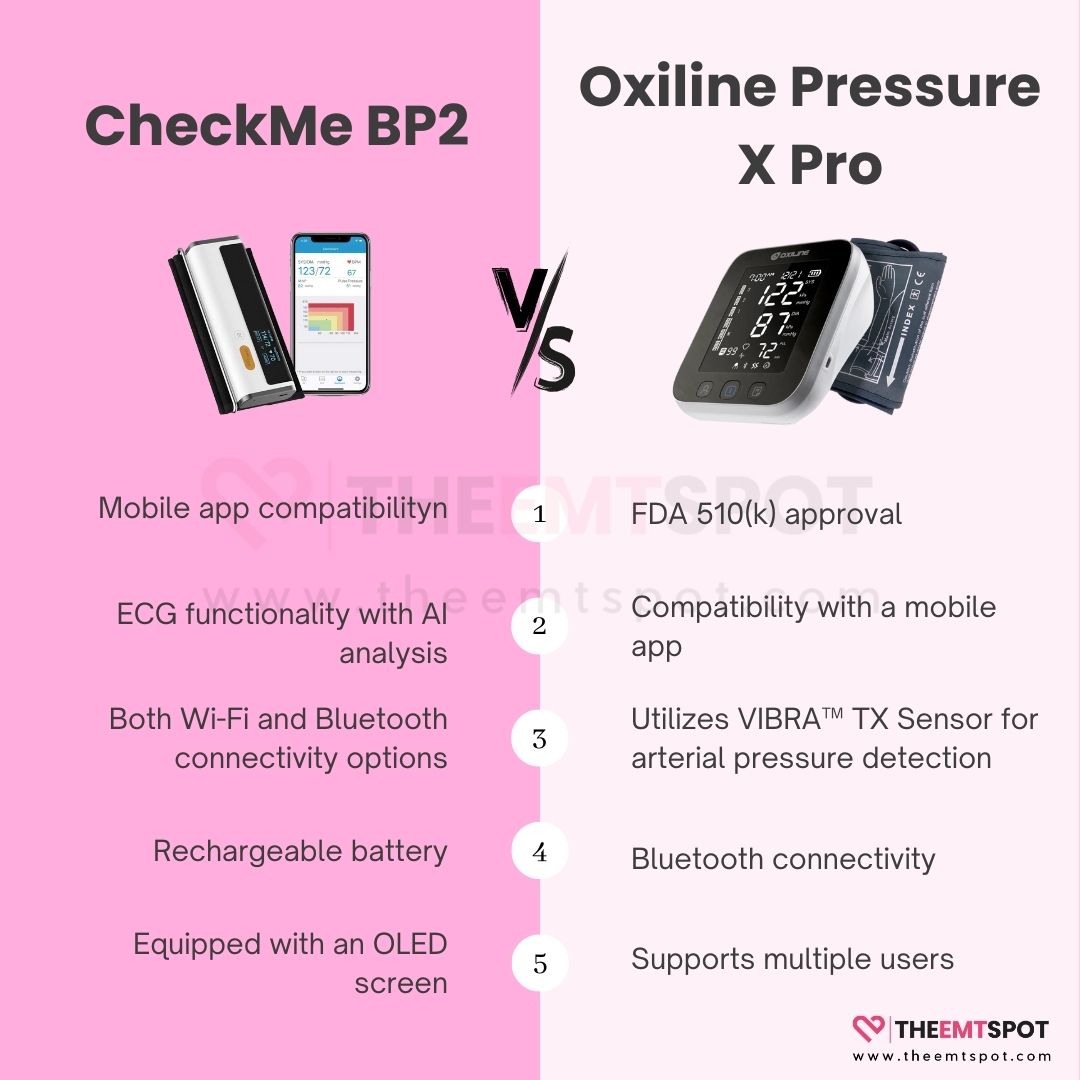
They are equipped with smartphone connectivity via Bluetooth, and both of them use dedicated sensors for tracking.
Both of them have built-in memory, support multiple users, and can be recharged.
While Pressure X Pro has a larger LED display, the CheckMe BP2 relies on the smartphone interface to display readings.
It is the only device in the budget range with ECG tracking. Withings BPM Connect and QardioArm are two other choices you can consider.
More in this topic


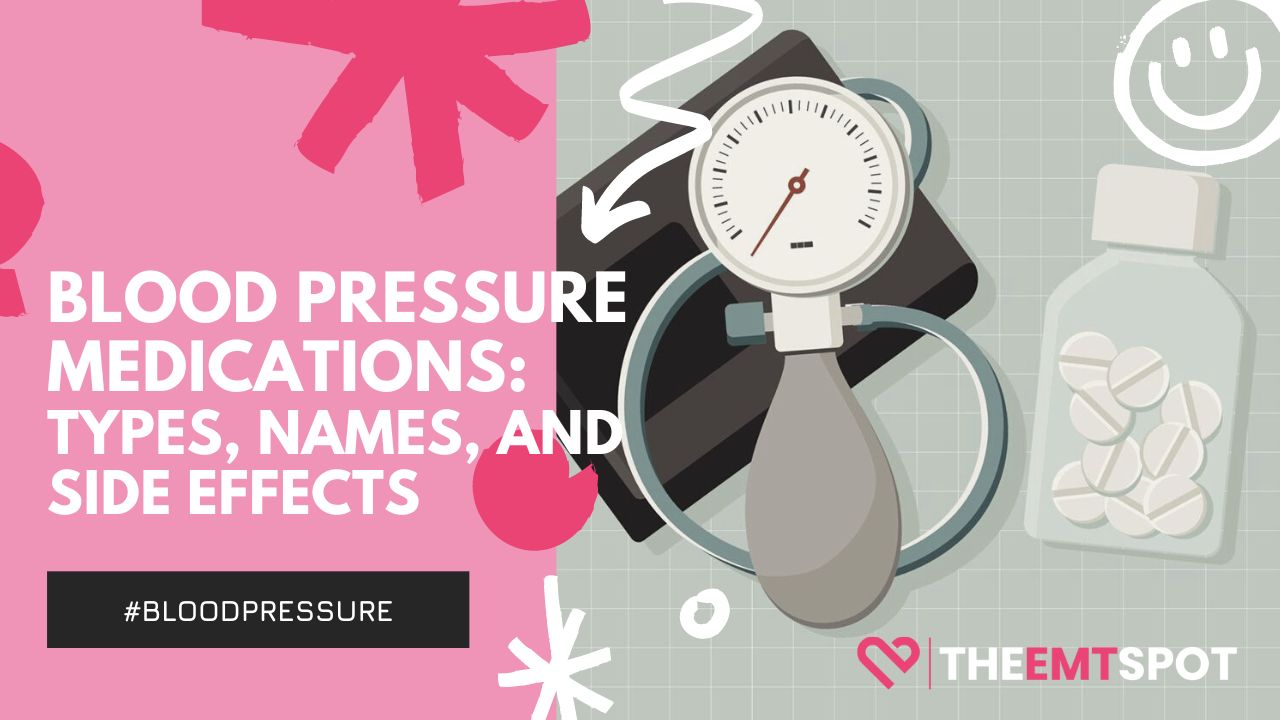
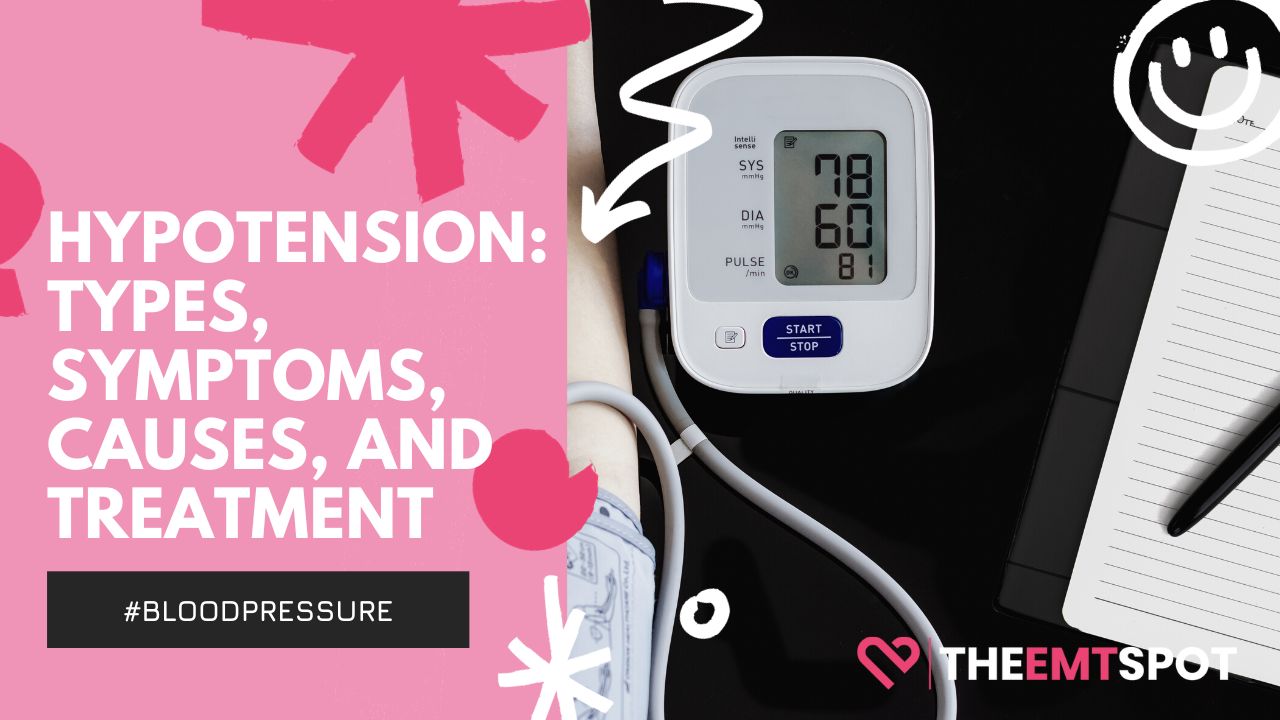
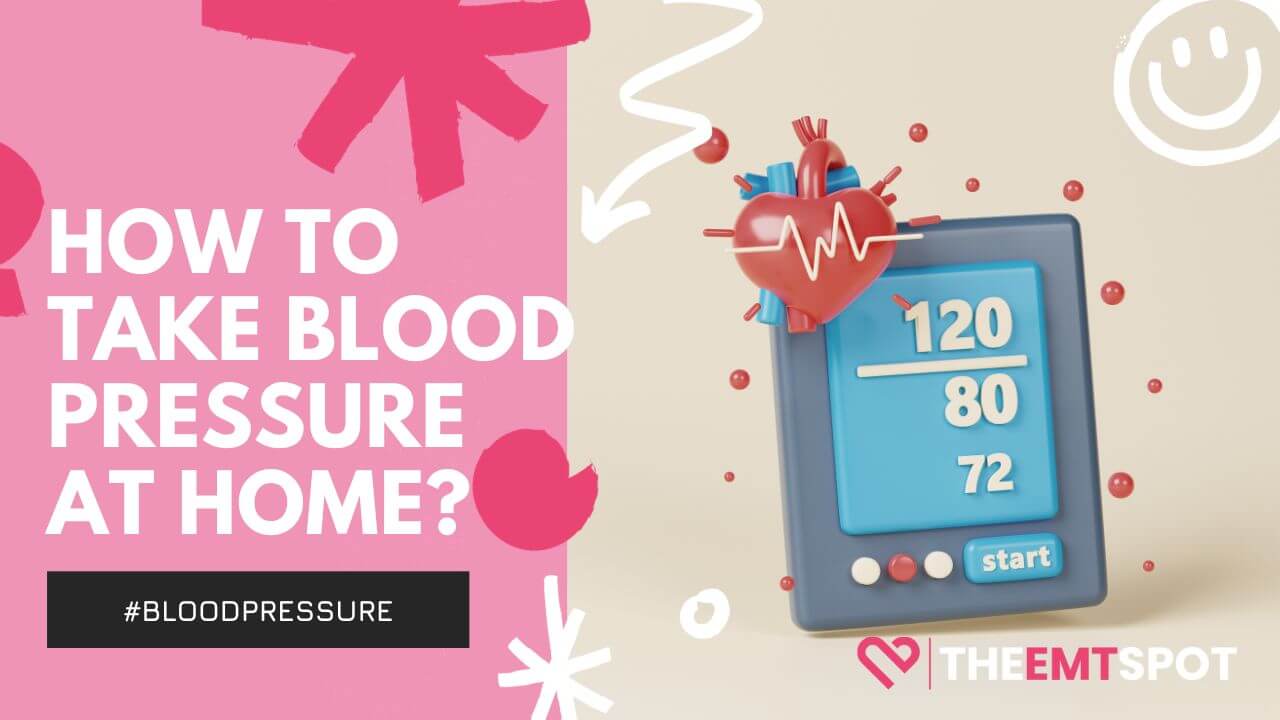

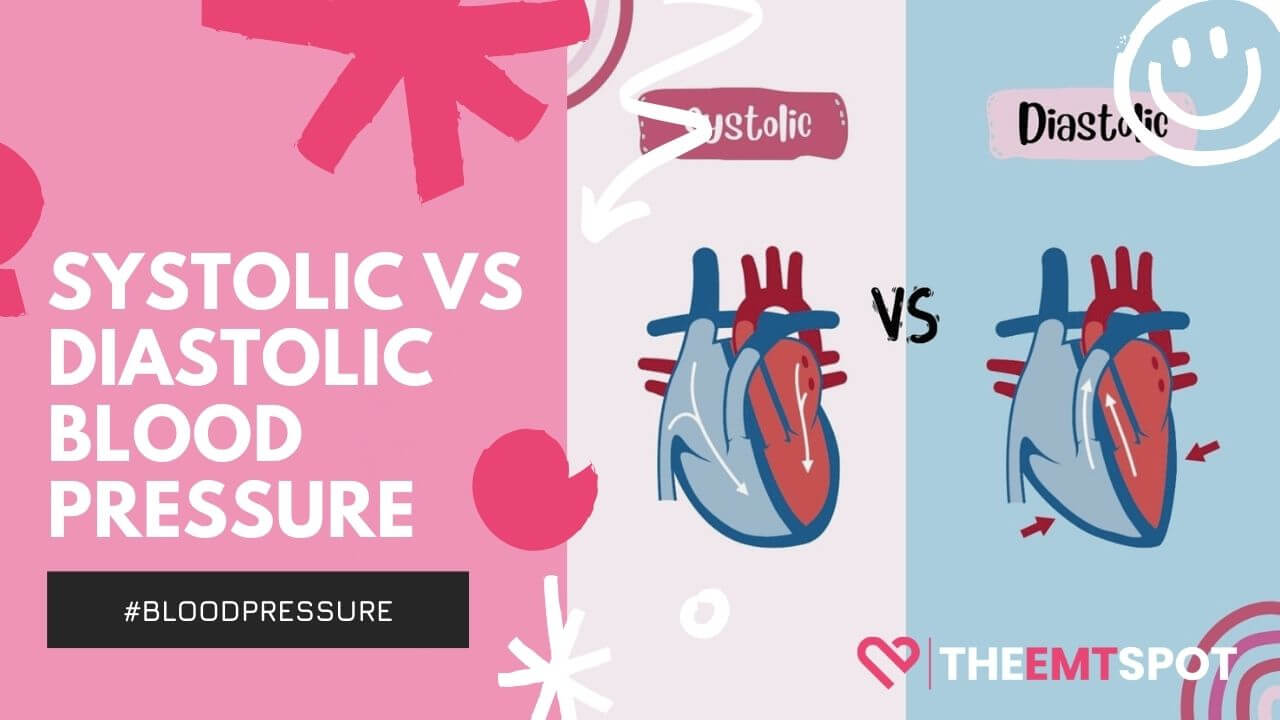
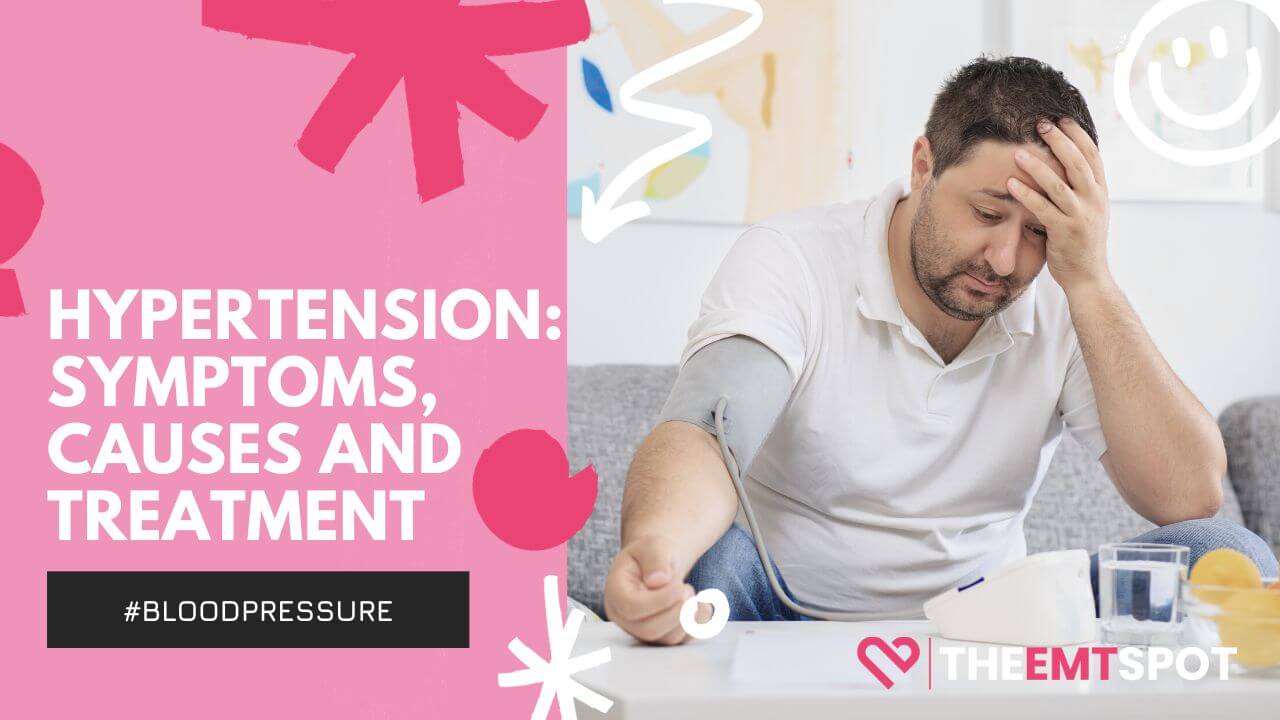

 Robin Backlund is a dedicated journalist and a medical student who has written several articles and essays exposing the falseness and hollowness of online resources in the medical science niche.
Robin Backlund is a dedicated journalist and a medical student who has written several articles and essays exposing the falseness and hollowness of online resources in the medical science niche.